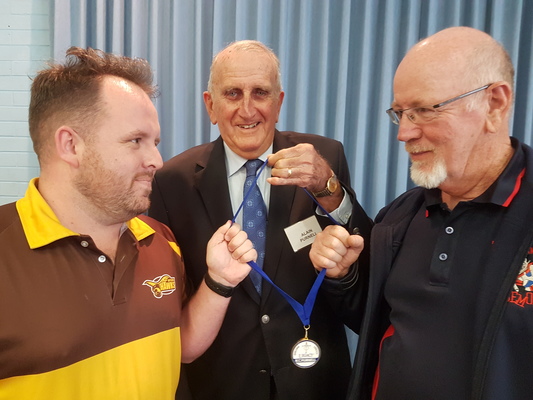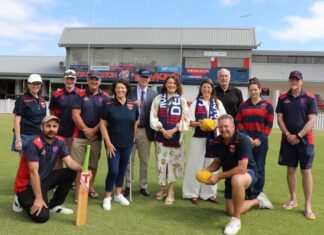By Luke Voogt
A Geelong doctor who rescued wounded soldiers as shells exploded around him has become the namesake for a local Anzac Day game medal.
Geelong Legacy on Monday named the best on ground medal for the traditional Bellarine Football League Anzac Day game after Kenneth Purnell.
“He’d be thrilled,” Kenneth’s proud son Alain said at the ceremony.
“If someone needed help he gave it to them and that’s why the idea of Legacy appealed to him.”
Captain Purnell received the Military Cross for dressing the wounded under heavy shell fire during an Allied attack on the Western Front on 29 September 1918.
He set up stretcher parties and helped them carry the wounded about 1000 metres under heavy artillery and machine gun fire to the nearest dressing station.
“Regardless of his own safety, this officer worked untiringly throughout the day under the most trying conditions and set a splendid example to all ranks,” his citation reads.
His war diary ends on 2 September 1918, but exactly a year before his commendation, he documented a bomb raid on his camp the previous night.
He noticed with fear the “unmistakable purring of a Hun plane overhead” before all hell broke loose:
“There was a deafening roar and a flash of blinding light, accompanied by a pungent and sickly odour,” he wrote.
He and fellow soldiers instinctively fell flat as bomb fragments flew around them.
“I shall never forget the few moments, which seemed like so many years, as I lay there counting the explosions and hearing the pieces fly as the succeeding seven or eight bombs fell close by.”
After the attack he called out “Is anybody hit?” through the thick black smoke and heard only “groans from all sides.”
“The first man I found had his back badly broken and was fast dying,” he wrote.
“The next I went to was dead, similarly the third and so on…
“Altogether four were dead, three dying, seven or eight more or less badly wounded. My groom was badly hit but got off with his life.
“Six of our horses, including my bonza chestnut ‘Trixie’, were killed.”
He escaped death by not being his tent, which he noted was “well knocked about”.
In France Captain Purnell met his future wife, Yvonne, a French Red Cross nurse and he returned to Paris in 1921 to marry.
He opened a medical practice in Ryrie Street, where Alain remembered growing up alonside his four sisters.
“He treated a lot of patients even if they couldn’t pay,” he said.
“I think my swimming lessons were a recompense for him. Another bloke used to bring us rabbits.”
Dr Purnell became the founding president of Geelong Legacy, before enlisting again in World War II, serving in the Middle East, Greece and New Guinea.
He was a skilled footballer in his younger years, playing in the University of Melbourne’s first 18 Australian rules team before the war.
Portarlington and Drysdale will clash during the traditional game next Wednesday with the best player to win the K. C. Purnell Medal.









